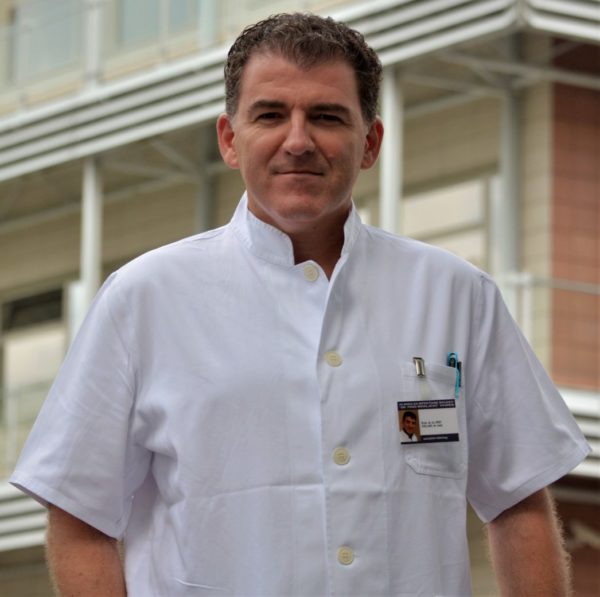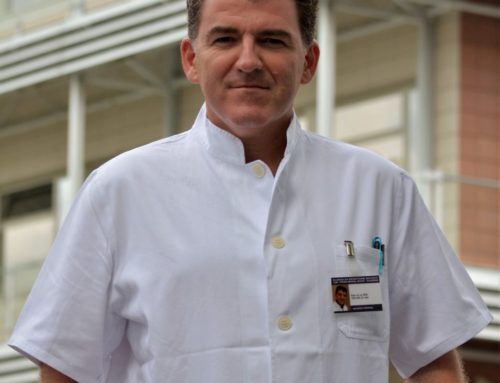Assist. Prof. Rok Čivljak, M.D., Ph.D., Infectious Disease Specialist
President of the Croatian Catholic Medical Society
The Search for the Deeper Meaning of Existence
By
April 2, 2020

“Perhaps this pandemic is an opportunity for us to turn toward one another and recognize Christ in all those who need our help. This is an opportunity for families to pray together, as Pope Francis recommends, talk to each other, reexamine ourselves and those around us, and thus find the deeper meaning of existence.”
On March 29, 2020, Assist. Prof. Rok Čivljak, M.D., Ph.D., an infectious diseases specialist and the president of the Croatian Catholic Medical Society, commented on recent decisions by the Catholic Church and recommendations during the current situation. “As an ID physician, I have personally shared my opinions with many priests on the risks of transmitting communicable diseases during liturgical celebrations, which are more or less contained in the Church directives. As a believer and member of the Croatian Catholic Medical Society, I understand and share the emotions of the faithful who are being deprived of Eucharistic Communion, as well as those who had to make such difficult decisions.”
We must not overstate the current situation
In a way, the coronavirus pandemic has caused media panic, said Dr. Čivljak. “Some media are expressing justifiable fear and concern about the pandemic, while others are inappropriately spreading panic. If we define panic as an excessive fear of actual or potential, that is to say, imagined dangers, in this situation panic and excessive fear can promote an increase in responsible but also somewhat irrational behavior that may ultimately be unconstructive. Considering what is happening in our neighboring countries, such as Italy, it is justifiable to increase precautionary measures and do everything possible to prevent the spread of this epidemic. However, we must not overstate the current situation in our country or take unnecessary measures, such as purchasing huge quantities of food and supplies, which has resulted in the disappearance of many goods from store shelves.”
On the suspension of public Masses for the first time in the history of the Church, Dr. Čivljak said: “At a moment when, for example, hundreds and thousands of Italians are falling sick and dying of this new pestilence known as COVID-19, I consider it completely justified to suspend all gatherings that could lead to the spread of infection, including the cancellation of religious gatherings at Masses or other forms of devotion. I believe that our personal faith during these extraordinary circumstances can be strengthened and manifested in some other ways, first of all through prayer, as well as by providing care and taking responsibility for those in need and our neighbors. Perhaps this pandemic is an opportunity for us to turn toward one another and recognize Christ in everyone who needs our help. This is an opportunity for families to pray together, as Pope Francis recommends, talk to each other, reexamine ourselves and those around us, and thus find the deeper meaning of existence, because it is not how long we shall live, with or without coronavirus, but how.”
Medicine is different now than in the fifteenth or nineteenth century!
Science, religion and medical practice each have their own domains. In today’s world, how can science, religion and medical practice be reconciled for the sake of human dignity and the safeguarding of human life? “I agree with the view, as recently expressed by Auxiliary Bishop Ivan Šaško, that remaining at home and refraining from public celebrations of the Eucharist will make it possible for us believers to contribute to the saving of many human lives.”
“Until this epidemic is under control, the faithful should practice other forms of devotion and prayer, alone, within their families or within their communities. Priests should celebrate the Eucharist in the intimacy of churches and monasteries, without the presence of congregants, until we can celebrate the Eucharist together and receive the Body and Blood of Christ, the greatest gift of the sacrifice he endured for us on the cross.”
“We are not being asked to relinquish prayer and every form of religious life but only gatherings and common liturgical celebrations. Some are attempting to compare the current coronavirus pandemic with similar epidemics and pandemics of the past. However, our medical knowledge today is not like that of the fifteenth or nineteenth century. We now know that many infectious diseases, including COVID-19, are transmitted through various forms of contact with infected persons, whether or not they have symptoms or are aware that they are ill. Close contact is defined as a distance of less than a meter. It permits the causative agent to be transmitted via droplets of saliva and secretions of the respiratory tract. Microorganisms are transmitted by touching objects and surfaces with the hands. Therefore, unnecessary close contacts should be avoided. Persons with respiratory symptoms should be prohibited from visiting public places and must wear masks. Everyone should wash their hands with soap and water or alcohol-based disinfectant after touching potentially contaminated surfaces. The Church’s recommendations are justified. If the coronavirus epidemic continues to spread throughout Croatia, the public celebration of the Eucharist is not advisable because it involves the gathering of a large number of people in one place. Neither is the shaking of hands as a sign of peace nor the receiving of Holy Communion in the mouth or hands, because both the mouth and hands can potentially harbor the virus. I recommend that until this epidemic is under control, the faithful should practice other forms of devotion and prayer, alone, within their families or within their communities. Priests should celebrate the Eucharist in the intimacy of churches and monasteries, without the presence of congregants, until we can celebrate the Eucharist together and receive the Body and Blood of Christ, the greatest gift of the sacrifice he endured for us on the cross.”
There are still no fatalities!
“In Croatia, there have been no fatalities from the coronavirus pandemic so far. On the contrary, Croatia has patients who have recovered. Why is so little said about this? The staff at my hospital, first of all the director, Prof. Alemka Markotić, M.D., Ph.D., and I, who are in charge of daily communication with the public, constantly emphasize the positive situation in Croatia: the initial absence of the infected and sick, and today the small number of cases and the absence of seriously ill patients or fatal outcomes. This may actually have contributed to the stability of the situation in Croatia because we cannot say that there were any instances of extreme panic or irrational behavior. However, as ID physicians, we are aware that we may see an increase in the number of cases tomorrow, and even possible fatal outcomes. Therefore, we must be responsible and prepared for the worst-case scenarios. It is better to be prepared to face adversity than to underestimate it and be caught off guard during an epidemic.”
Prayer and responsible behavior
Dr. Čivljak issued an appeal to the faithful:
“First, I appeal to all the faithful, as well as other citizens, to practice responsible behavior. Standard hygienic measures and, where appropriate, self-isolation and other anti-epidemic measures can significantly reduce the spread of the virus in the community, resulting in fewer cases. This particularly applies to persons at increased risk, such as the elderly or those with chronic and/or serious illnesses, but also their contacts and family members can be endangered.
“Health care workers, whose behavior and professionalism determine the success of the battle against the coronavirus pandemic, are not exempted from responsibility. At this moment, we must not lose our confidence in God, who is with us during this trial. We should pray, first of all, for persons and families afflicted by the disease caused by the new coronavirus, and then for all those who care for the infected and sick. All types of heath care professionals, not only physicians, but also nurses and technicians, midwives, pharmacists, biochemists and other laboratory personnel, and all those working in health care institutions who are not medical professionals, are facing a great challenge. At the risk of falling ill themselves, they make it possible for the entire health care system to function properly. This requires great sacrifice and effort, much more than usual, because there are too few health care professionals in Croatia and many challenges await us. During this epidemic, it is to be expected that some health care workers will become infected, ill and unable to carry out their duties, thereby increasing the workloads of those who remain well.
“Everyone should pray, act responsibly and do everything possible to ensure that heath care professionals can carry out their tasks safely and successfully, or express gratitude to them in some other way.
“It is up to us health care professionals, with God’s help, to perform our daily tasks responsibly and conscientiously, in order to protect our population, prevent the spread of contagion and help those who are already infected and ill.”
Humanitarianism overcomes fear
Dr. Hrvoje Minigo, a retired physician and former president of the Croatian Chamber of Medicine, sent the following letter to Dr. Čivljak:
Dear Colleague, Dr. Čivljak,
I know you are very busy under the present circumstances. Thinking about how I personally might be of use with my experience, I am willing to make at least a small contribution. This could be, for example, telephone contact with persons in self-isolation or something of that nature.
If you think this could be of help, please submit my proposal to Prof. Markotić. I would be happy to be of service.
God bless you
Dr. Hrvoje Minigo.
“This letter is an example for all of us. Each one of us can contribute in some way to the battle against this disease. No matter how small or insignificant an act may seem, such as a telephone call or letter to a patient or health care provider, goodness will always make us feel loved and wanted, thereby generating other good works for the benefit of the whole community,” concluded the president of the Croatian Catholic Medical Society, Dr. Rok Čivljak.
Translated by Margaret Casman-Vuko
Available in Croatian at https://www.glas-koncila.hr/doc-dr-rok-civljak-dr-med-infektolog-predsjednik-hrvatskoga-katolickoga-lijecnickoga-drustva-traganje-za-dubljim-smislom-postojanja/










